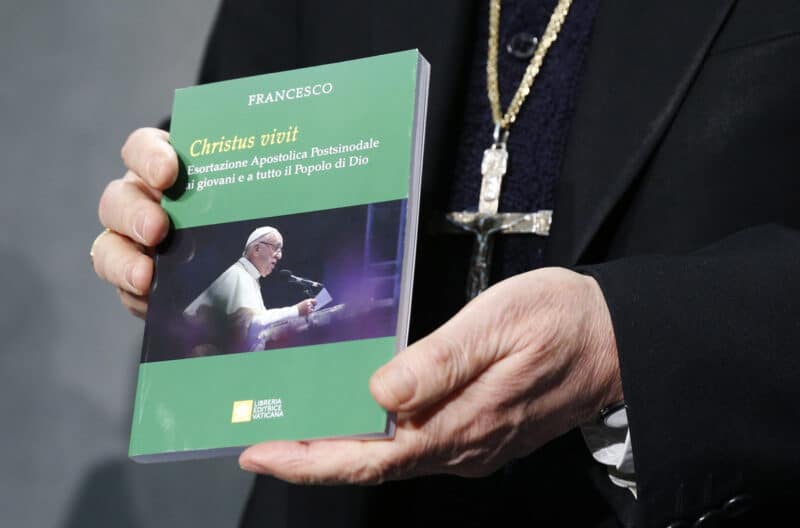“Christ is alive and He wants you to be alive!” The opening lines of the Apostolic Exhortation set both the tone and the content of the Pope’s message. But the closing lines are what make the document an “exhortation” in the true sense of the word: “The Church needs your momentum, your intuitions, your faith”, writes Pope Francis”. “And when you arrive where we have not yet reached, have the patience to wait for us”.
Pope Francis’ message is addressed not only to young people, but also to “the entire People of God”. The Pope says he was “inspired by the wealth of reflections and conversations” that took place during last October’s Synod, on the theme of “Young People, the Faith and Vocational Discernment”, and he divides his reflections into nine chapters.
Chapter 1: The Word of God and Young People
Pope Francis begins by giving Old Testament examples of how, “in an age when young people were not highly regarded, some texts show that God sees them differently”. Turning to the New Testament, he reminds us that, as far as Jesus was concerned, “age did not establish privileges, and being young did not imply lesser worth or dignity”.
Chapter 2: The Ever-young Jesus
The Pope continues by presenting an eternally young Jesus as the model for a Church that is young “when she is herself”, a Church that “dares to be different”. Pope Francis admits that the figure of Jesus is not always presented in an “attractive and effective way”. On the contrary, he writes, there are young people who consider the Church “a nuisance, an irritant”. They want a Church that “listens”, not one that “condemns”.
Chapter 3: The “Now” of God
Young people are more than “the future of our world”, says Pope Francis: “even now they are helping to enrich it”. Which is why they are not satisfied with “prepackaged answers and ready-made solutions”. The Pope examines a series of challenges, ranging from migration and exploitation, to sexuality, and the pros and cons of living in a digital world. He also addresses the issue of child abuse. “With the help of young people”, he suggests, “this dark moment…can be an opportunity for a reform of epoch-making significance”.
Chapter 4: Three Great Truths
Chapter four of the Exhortation contains what Pope Francis calls Three Great Truths. The first is that “God loves you”, with a love that is more concerned with “reconciling than forbidding…with the future than with the past”. The second is that “Christ saves you”, forgiving us “time and again…bearing us on His shoulders”. The third is that “Christ is alive”, a realization that helps us to “stop complaining, and look to the future”.
Chapter 5: The Age of Choice
Pope Francis describes youth as “the age of choice”, and suggests we should not be “afraid to take chances and make mistakes”. Working for the “common good” and “living the present” are themes the Pope explores in Chapter five, along with a call for young people to be “protagonists of change”, and “courageous missionaries”.
Chapter 6: Young People and the Elderly
In Chapter 6, Pope Francis reminds young people how important it is for them to maintain a relationship with the elderly: “so that we can benefit from their experience”, he writes. The Pope observes how “the old dream dreams and the young see visions… If young people sink roots in those dreams”, he says, “they can peer into the future”.
Chapter 7: Youth Ministry
Youth ministry is the focus of Chapter seven. According to Pope Francis, youth ministry should be “flexible”, an opportunity to “journey together”. Young people are moved by “the grammar of love”, he says”, “not by being preached at”. The Pope stresses the need to identify “new approaches” that are creative and even daring. The arts, sports, and care for the environment”, are all areas of positive pastoral development, he writes.
Chapter 8: Vocation
Responding to our vocation means fostering and developing “all that we are”, says Pope Francis in Chapter eight. This may find expression in Holy Matrimony, he writes, where “true love is passionate” and sexuality has two purposes: “to love and to generate life”. But the Pope also challenges young people to consider “the vocation to special consecration” and not to “dismiss the possibility” of devoting themselves to God.
Chapter 9: Discernment
In the final Chapter of the Exhortation, Pope Francis reminds us that: “Without the wisdom of discernment, we can easily become prey to every passing trend”. A vocation is a gift, but it is also demanding, he writes. In order to enjoy the gifts of God, “we have to be ready to take risks”.
The Pope’s final words in the document are an implicit challenge to take such risks: “Dear young people”, concludes Pope Francis, “my joyful hope is to see you keep running the race before you, outstripping all those who are slow or afraid!”

This is a wonderful message, and it is for the church of the future, and the church of today.
It is important that young people enter the mystery.
Many beautiful stories exist of young saints and even young martyrs.
But it has one flaw: TIMING
Only after significant expensive lawsuits have been sent out,
damning the church in monstrous ways on pedophilia,
that this has surfaced.
Meanwhile, youth have voted with their feet.
Pope Francis, you really need someone to re-prioritise your activities desperately.
You should have put young people FIRST on your agenda when you became Pope, not LAST.